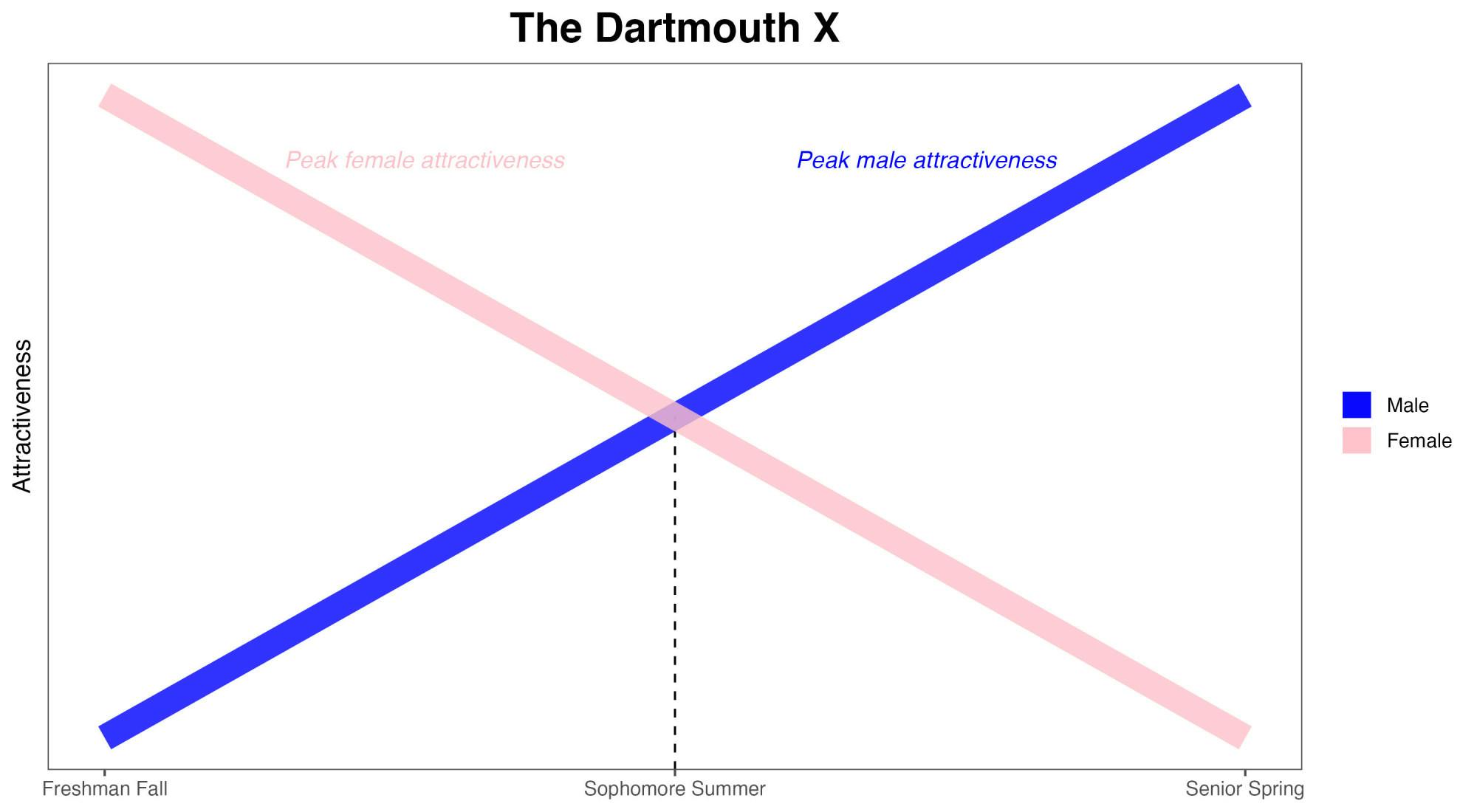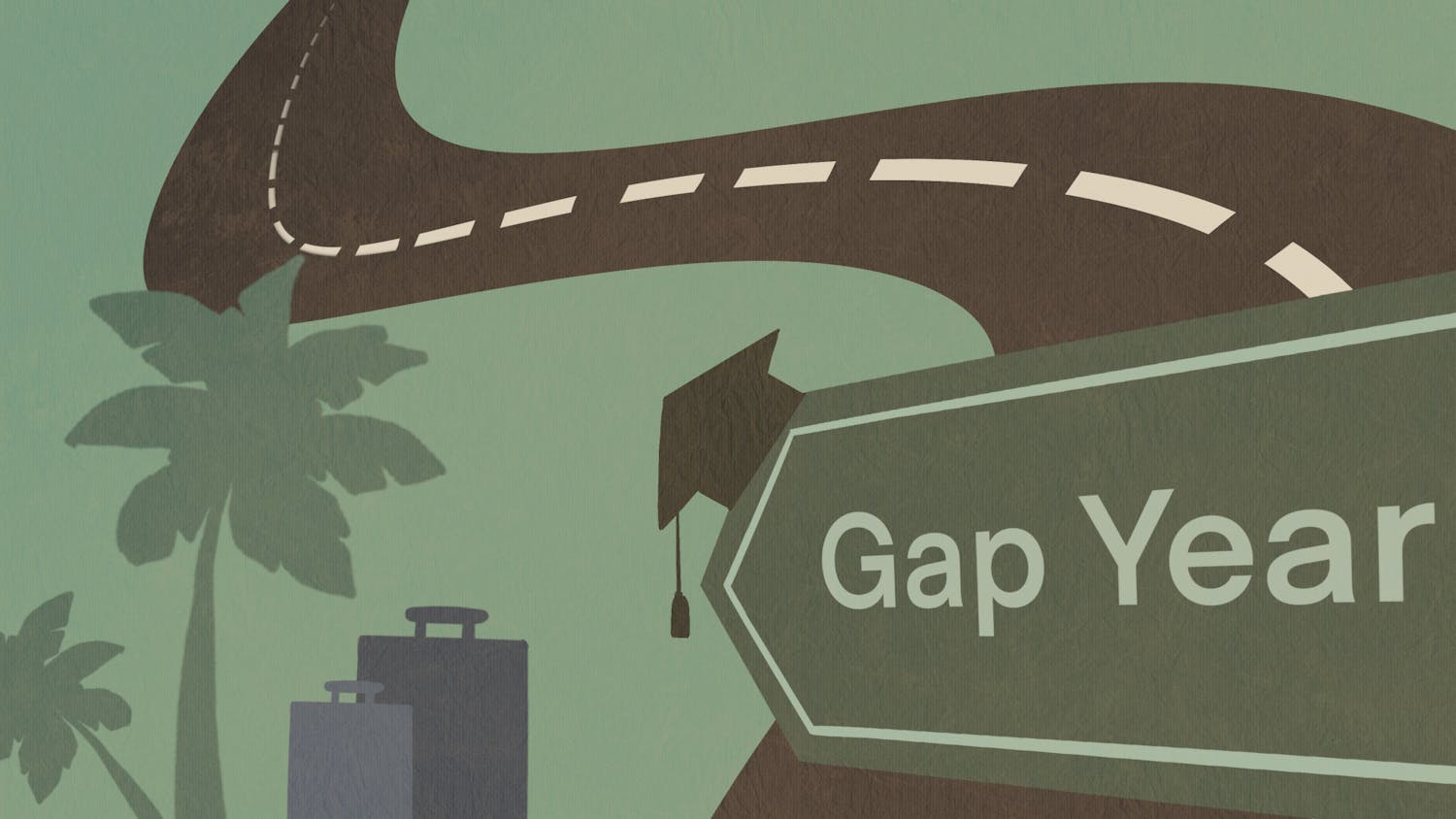With every second that passes during your time at Dartmouth, you become less attractive — if you identify as a woman, that is. This statement is almost laughably absurd, yet it is the narrative that the Dartmouth X peddles to women.
The Dartmouth X suggests that we imagine a graph of two lines: One line represents the men on campus, and the other represents the women. The x and y axes represent time and attractiveness at Dartmouth, respectively. The line for women has a downward slope — Dartmouth women reach their “peak attractiveness” the moment they step on campus during their freshman fall and decrease in attractiveness over four years, or so the concept claims. The line for men, on the other hand, has an upward slope — men are the least attractive in their freshman fall and the most attractive during their senior year. The midpoint of the graph, when both groups are theoretically equally attractive, occurs during the midpoint of students’ time at Dartmouth: sophomore summer.
Though I had heard of this concept before, I struggled to remember how or when I had first discovered it. A Google search of the term revealed only one article from the Dartmouth Folklore Archive, an anonymous interview with a female member of the Class of 2017. Knowledge of the concept thus appears to pass down through class years, primarily by word of mouth. Haley Rose ’25 reported that she learned of the Dartmouth X after several upperclassmen described it to her.
“I remember hearing about this from one of my female friends freshman year… I didn’t really take it that seriously,” Chris Colsman ’25 said.
Many other students were unfamiliar with the concept. Regardless of familiarity, however, each student had an opinion on why the Dartmouth X exists.
“Younger women might be found more attractive because of their innocence and vulnerability, which is really screwed up,” Ady Chaudhari ’24 said.
Rose stated that perhaps the X exists because of broader societal tropes.
“It’s considered more normal for guys to date ‘down’ [in age] whereas girls who do this are called ‘cougars,’” Chaudhari said. “Guys may also be willing to date down when it’s with someone who might not know their history or their red flags.”
Madeleine Carr ’25 noted a similar pattern on campus.
“I don’t know if it has anything to do with the X, but it seems to be a common trope that senior guys go for freshman girls,” she said. “If you base it on the graph, that’s everyone at their peak level.”
Though the origin of the X is ultimately unknown, students were quick to point out the negatives associated with having the concept as part of our campus consciousness.
“It kind of enables predatory behavior when you’re peddling the narrative that the most attractive groups of people at Dartmouth are the women who have just entered the social scene, and the men who are the most established in that scene,” Owen Duncan ’26 said. “To just make a generalization that a group of people gets less attractive over time is rooted in objectification.”
“If people are really taking this imaginary chart that doesn’t exist to heart, it adds validity to an older guy going for a younger woman, even if the guy is 20 and she is barely 18,” Carr said. “It’s a justification for being a creep to an extent.”
Chaudhari explained how making generalizations about the attractiveness of a group of people can lead to insecurities.
“Dartmouth is known to be a place where eating disorders are often very much propagated, and I think with our high-stress culture, the last thing we need are more insecurities, especially ones about the way we look,” she said. “This concept only benefits men on this campus.”
Some students appear more than happy to retire the concept — in fact, many already don’t believe the X holds any relevance to their lives. For example, Colsman said he often doesn’t see the concept in practice on campus.
“A lot of the guys in my fraternity will make fun of you if you’re with a girl who’s younger than you or out of your age range,” he said. “I don’t think people care so much about age as much as whether the person is a good fit for you.”
Rose noted that the Dartmouth X does not cross her mind when she’s considering potential partners.
“I’m more looking for people who share my same interests, who I can talk to easily and who may have shared some similar Dartmouth experiences,” she said.
Chaudhari rejected the X entirely.
“I feel like [attractiveness levels] have been the opposite,” she said. “Women get more attractive because they tend to grow into themselves throughout college, while senior men look exactly the way they looked coming into college.”
Although sophomore summer is the supposed midpoint of the X, each of the ’25s I spoke to reiterated that the concept hasn’t crossed their minds.
“I can’t say I believe in the X, but I do like sophomore summer for relationship reasons because it gives you a chance to meet someone in your grade who will be at Dartmouth as long as you are,” Rose said.
Thus, while the X is not at the forefront of students’ minds this summer, it does seem as though summer term has shifted students’ thinking about relationships.
Many Dartmouth students hope to banish the X from the collective imagination. As Colsman noted, if you focus too heavily on the X, “you might exclude someone from your potential dating pool that you might truly love if you just spent some time with them.”
And even for those who may find themselves at the “top of the X,” such as incoming freshmen women, Chaudhari would advise them to ignore the concept as well.
“Ignore these ridiculous and misogynistic ideas that are spread throughout campus and be who you are,” Chaudhari said. “That philosophy has allowed me to grow into myself, and I’m more confident now than I ever was throughout my time at Dartmouth.”




